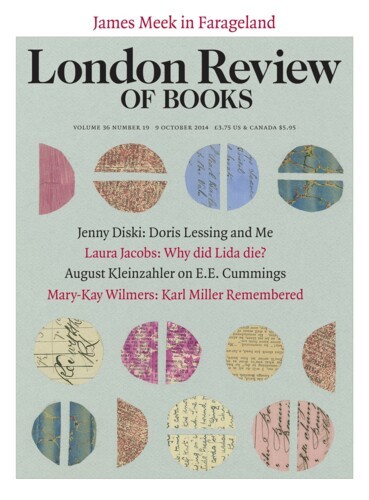Israel's justifications for its assault on Gaza have shifted more than once since Operation 'Brother's Keeper' was launched on 12 June, supposedly in response to the kidnapping of three Israeli teenagers. The rockets 'raining down terror' on Israel (they have so far killed three people, giving them a kill rate of 0.1 per cent) were the reason given for the launch of operation 'Protective Edge' on 8 July; the ground invasion of Gaza on 17 July was said to be aimed at destroying a series of tunnels leading into Israel.
Omar Robert Hamilton
Omar Robert Hamilton ’s first novel, The City Always Wins, will be published by Faber in 2017.
We pulled up to the shining blue facade of the main hall of the Islamic University in Gaza in the summer of 2012. The Palestine Festival of Literature was running a seminar and an afternoon of workshops with students from the Arabic and English departments. Jamal Mahjoub, Selma Dabbagh and Amr Ezzat spoke to a packed auditorium of around 200 students, mostly young women, all veiled. The university enforces a dress code. Someone smiled at me from the crowd and it was a full three seconds before I recognised my friend and colleague Rana. She is not normally veiled. But this is the university with the best facilities.
On 26 August a ceasefire between Israel and Hamas was agreed, bringing a fragile end to a war that killed 2150 Palestinians (mostly civilians) and 73 Israelis (mostly soldiers). Since then Hamas has not fired a single rocket, attacked an Israeli target, or done anything to break the terms of the ceasefire. Israel has done the following:
On Hunger Strike: On Hunger Strike
Omar Robert Hamilton, 9 October 2014
After the shock and awe tactics of the Rabaa massacre last summer, when Egypt’s military regime murdered around a thousand supporters of the deposed president, Mohamed Morsi, the rolling counter-revolution has played out mostly within the justice system, between police stations, prisons and courtrooms. The system is self-contained and unaccountable: graduates of the Police Academy...
On Saturday, the court case known in Egypt as the Shura Council trial was in session. Judge Hassan Farid entered the courtroom, flanked by the two other judges on the panel and a couple of morose security guards. The defence were to continue their closing arguments, the prosecution having wrapped up a month ago. But before the defence could begin, the judge leaned in to his microphone and asked if the prosecution had anything they wanted to say. The courtroom fell into a stunned silence – and then erupted in protest.
Pieces about Omar Robert Hamilton in the LRB
We’ll win or lose it here: Lessons from Tahrir Square
Robert F. Worth, 21 September 2017
One of many remarkable aspects of Egypt’s 2011 revolt was its intense self-consciousness. It wasn’t just that the sit-ins were being broadcast 24 hours a day on satellite TV, with...
Read anywhere with the London Review of Books app, available now from the App Store for Apple devices, Google Play for Android devices and Amazon for your Kindle Fire.
Sign up to our newsletter
For highlights from the latest issue, our archive and the blog, as well as news, events and exclusive promotions.


